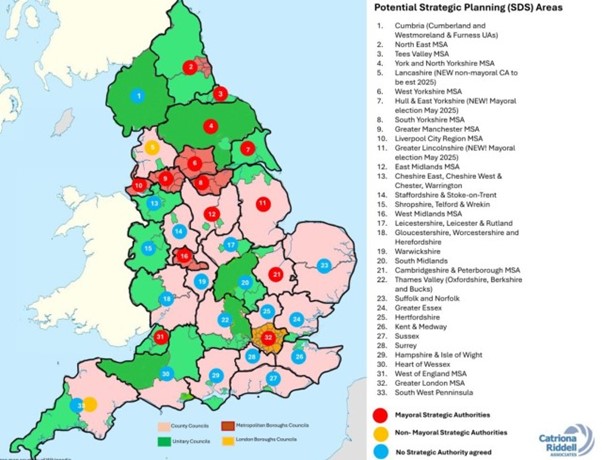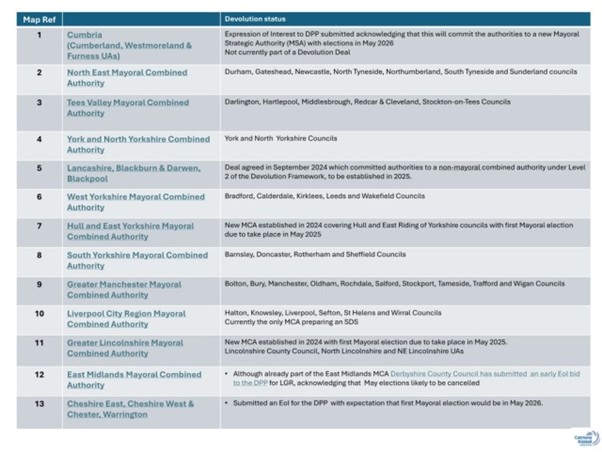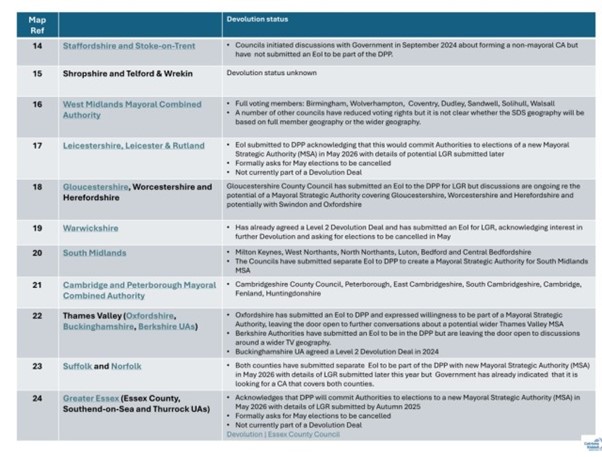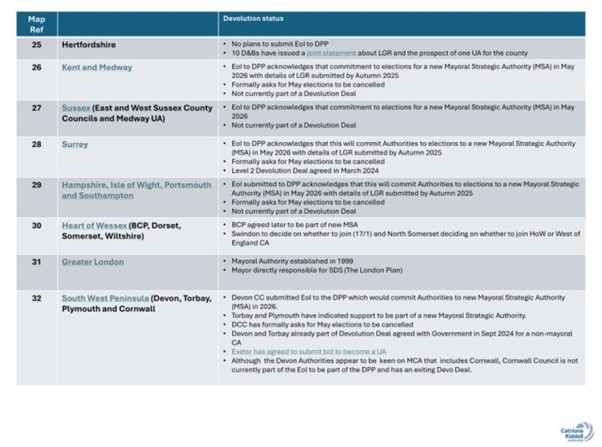Viva La Devolution!
- Details
Perhaps it is more like revolution, certainly rapid evolution, and possibly even in some respects the reverse of devolution, writes Simon Ricketts.
In my 21 December 2024 blog post And Now Take A Deep Breath… I set out what there was in the 16 December 2024 English Devolution White Paper as to the proposed introduction of spatial development strategies across the whole of the country by the end of this Parliament with which local plans will need to be in general conformity. Aside from setting minimum housing requirements for each member authority, SDSs will identify infrastructure needs and strategic locations for development, presumably including where appropriate high level reviews of green belt boundaries.
SDSs will be produced by strategic authorities and in some instances, to begin with, other groupings of local authorities directed by the Secretary of State via powers to be included in the Planning and Infrastructure Bill which is to be published in March.
Strategic authorities will fall into one of two categories:
- “Foundation Strategic Authorities: these include non-mayoral combined authorities and combined county authorities automatically, and any local authority designated as a Strategic Authority without a Mayor.
- Mayoral Strategic Authorities: the Greater London Authority, all Mayoral Combined Authorities and all Mayoral Combined County Authorities will automatically begin as Mayoral Strategic Authorities. Those who meet specified eligibility criteria may be designated as Established Mayoral Strategic Authorities. This unlocks further devolution, most notably an Integrated Settlement.
The government’s strong preference is for partnerships that bring more than one local authority together over a large geography. In exceptional circumstances the Secretary of State will have the power to designate an individual local authority as a Foundation Strategic Authority only. Our ambition remains for all parts of England to ultimately have a Mayoral (and eventually Established Mayoral) Strategic Authority.”
Much of the detail is yet to emerge, for instance:
- What will be the necessary evidence base to support these SDSs and how will they be examined and will there be a refined version of the current “soundness” test?
- Will SDSs have to divide out for the constituent member authorities as minimum housing requirements the collective total local housing need for the SDS area and will each local plan need to accept that figure as its minimum housing target?
- What will be the tramlines as to what may, must and must not and may be included in SDSs?
- How will internal political differences between member authorities be contained where real tensions arise over, for instance, the allocation of housing numbers?
- How and to what extent will strategic authorities be required to coordinate with their neighbours?
Of course, core to the government’s reform proposals is not just the universal coverage of the country by strategic authorities (the default assumption being for each to have a combined population of 1.5 million or above), but, below that level, unitary rather than two tier authorities:
“We will expect all two tier areas and smaller or failing unitaries to develop proposals for reorganisation. We will take a phased approach to delivery, taking into account where reorganisation can unlock devolution, where areas are keen to proceed at pace or where it can help address wider failings. However, we are clear that reorganisation should not delay devolution and plans for both should be complementary.
New unitary councils must be the right size to achieve efficiencies, improve capacity and withstand financial shocks. For most areas this will mean creating councils with a population of 500,000 or more, but there may be exceptions to ensure new structures make sense for an area, including for devolution, and decisions will be on a case-by-case basis.”
In terms of the creation of strategic authorities, many councils have already expressed interest in becoming part of the Government’s Devolution Priority Programme, which is for areas wishing to pursue establishment of a Mayoral Strategic Authority. This will be with a view to inaugural mayoral elections in May 2026. The Local Government Association has published a list.
What could this all mean in terms of what the areas will be for SDSs? Catriona Riddell yesterday posted her current understanding as below:




In terms of the move towards unitary authorities, local government minister Jim McMahon wrote to two tier authorities on 16 December 2024:
“As set out in the White Paper, new unitary councils must be the right size to achieve efficiencies, improve capacity and withstand financial shocks. For most areas, this will mean creating councils with a population of 500,000 or more. However, there may be exceptions to ensure new structures make sense for an area, including on devolution.”
“We will take a phased approach and expect to deliver new unitary authorities in April 2027 and 2028.”
“I have heard from some areas that the timing of elections affects their planning for devolution, particularly alongside reorganisation. To help manage these demands, alongside our objectives on devolution, and subject to meeting the timetable outlined in this letter, I am minded-to lay secondary legislation to postpone local council elections from May 2025 to May 2026.
However, I will only do this where this will help the area to deliver both reorganisation and devolution to the most ambitious timeframe – either through the Devolution Priority Programme or where reorganisation is necessary to unlock devolution or open up new devolution options.”
“To lay the relevant legislation to postpone elections, I will need a clear commitment to devolution and reorganisation aims from upper-tier councils in an area, including a request from the council/s whose election is to be postponed, on or before Friday 10 January.”
Again, the Local Government Association’s list is helpful - of counties and unitaries which have made requests, involving postponing their election from 2025 to 2026.
Whilst the government’s advice is that none of this should slow down current local plan making it is going to be interesting to see what transpires – and the local political implications more generally of postponed elections (who knows, perhaps the potential for longer term decision making?).
The pace of change ahead of publication of either the Planning and Infrastructure Bill or the English Devolution Bill is certainly impressive.
There’s an interesting quote from Arthur Clarke about revolution - and possibly it extends to devolution as well:
“Every revolutionary idea seems to evoke three stages of reaction. They may be summed up by the phrases: (1) It's completely impossible. (2) It's possible, but it's not worth doing. (3) I said it was a good idea all along.”
Simon Ricketts is a partner at Town Legal. This article first appeared on his Simonicity planning law blog.
Sponsored articles
Unlocking legal talent
Walker Morris supports Tower Hamlets Council in first known Remediation Contribution Order application issued by local authority
Commercial Lawyer
Solicitor - Contracts and Procurement
Legal Director - Government and Public Sector
Locums
Poll





































